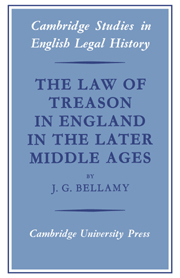Book contents
- Frontmatter
- Contents
- Editor's Preface
- Preface
- List of Abbreviations
- 1 The Medieval Concept of Treason
- 2 The Treatise Writers and the English Law of Treason at the End of the Thirteenth Century
- 3 The Origins of the English State Trial
- 4 The Great Statute of Treasons
- 5 The Scope of Treason, 1352–1485
- 6 Treason before the Courts, 1352–1485
- 7 The Origins and the Early History of the Act of Attainder
- 8 Treason and the Constitution
- Appendixes
- Select Bibliography
- Index
2 - The Treatise Writers and the English Law of Treason at the End of the Thirteenth Century
Published online by Cambridge University Press: 14 October 2009
- Frontmatter
- Contents
- Editor's Preface
- Preface
- List of Abbreviations
- 1 The Medieval Concept of Treason
- 2 The Treatise Writers and the English Law of Treason at the End of the Thirteenth Century
- 3 The Origins of the English State Trial
- 4 The Great Statute of Treasons
- 5 The Scope of Treason, 1352–1485
- 6 Treason before the Courts, 1352–1485
- 7 The Origins and the Early History of the Act of Attainder
- 8 Treason and the Constitution
- Appendixes
- Select Bibliography
- Index
Summary
Bracton's definition of treason in his De Legibus et Consuetudinibus Angliae or rather that definition as refined by the later writers Fleta and Britton was the terminus a quo for all later declaration of law in that field. The works of Fleta and Britton were compiled at least a generation after Bracton's De Legibus and were based largely upon it. They do however help to establish more precisely how the law of treason stood at the time of Edward I. Bracton, Fleta and Britton each included the killing of the king or plotting to kill the king and Bracton and Fleta appended the mere giving of assent to such a scheme. Britton held it was treason to disinherit the king of his kingdom as it was to kill the king's father, mother, consort or children. Only Bracton included the concealment of a knowledge of a traitorous plot in as many words. Unlike the other two writers Britton distinguished between great and little treason. These were not the same as the crimes referred to in the 1352 act as high and petty treason. Great treason was not only to procure the death of the king but also to kill one's own lord or to violate his wife or daughters. One treason on which all the three writers were in agreement was forgery. This was held to include the counterfeiting of false coin, the clipping of good coin and the falsifying of the king's seal. The Mirror of Justices, written about 1290 and attributed to Andrew Horn, chamberlain of London, seems to have owed less to Bracton than did Fleta and Britton.
- Type
- Chapter
- Information
- The Law of Treason in England in the Later Middle Ages , pp. 15 - 22Publisher: Cambridge University PressPrint publication year: 1970

